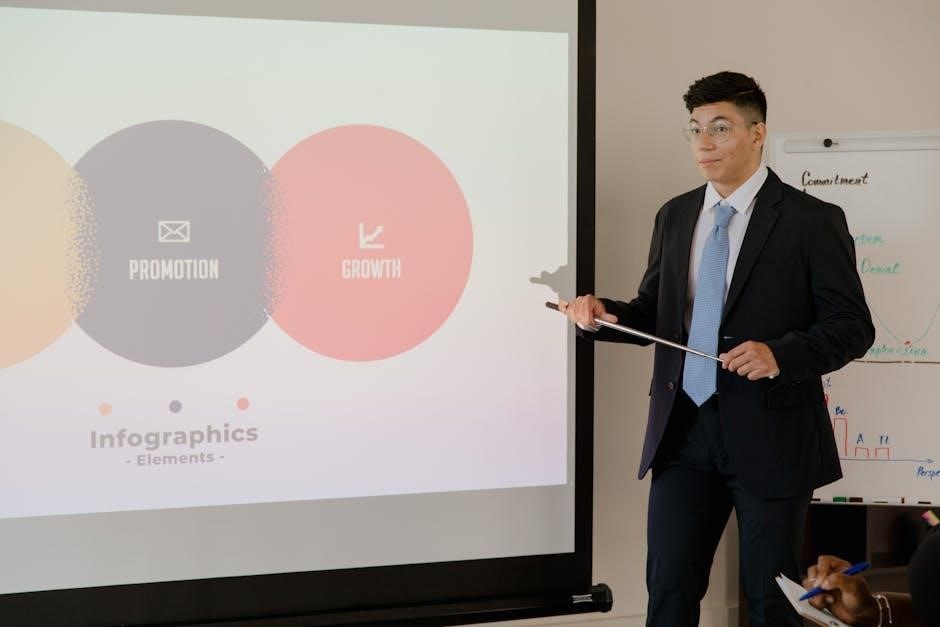Instructional coaching professional development is a collaborative‚ goal-oriented process where coaches work with teachers to enhance instructional techniques‚ fostering improved teaching practices and student success. It serves as a pivotal component in educational reform‚ offering personalized support and resources to educators.
1.1 Definition and Purpose
Instructional coaching is a targeted‚ collaborative process where coaches partner with teachers to improve instructional practices. Its purpose is to enhance teaching methods‚ aligning with educational goals‚ and fostering student success. By providing personalized support‚ instructional coaching aims to bridge the gap between theory and practice‚ ensuring educators are equipped to meet diverse learner needs effectively. This professional development strategy focuses on practical application‚ empowering teachers to implement research-based strategies and continuously refine their skills for improved outcomes.
1.2 Importance in Modern Education
In modern education‚ instructional coaching plays a crucial role in helping teachers adapt to new methodologies and technologies. It offers tailored support to address the diverse needs of students‚ thereby improving teaching quality and student achievements. By fostering a collaborative school culture‚ instructional coaching encourages teacher retention and ongoing professional development. This approach ensures educators are well-prepared to meet contemporary educational challenges and implement innovative strategies effectively‚ contributing to overall educational advancement.

Key Concepts in Instructional Coaching
Instructional coaching focuses on enhancing teaching strategies through collaboration and targeted support‚ emphasizing teacher growth and improved student outcomes. It involves systematic approaches to professional development.
2.1 What is Instructional Coaching?
Instructional coaching is a goal-oriented‚ collaborative process where coaches work with teachers to improve teaching strategies and student outcomes. It focuses on enhancing instructional practices through personalized support‚ data-driven approaches‚ and reflective dialogue; Unlike traditional professional development‚ coaching is tailored to individual teacher needs‚ emphasizing practical application and continuous improvement. Coaches provide resources‚ feedback‚ and guidance‚ fostering a non-evaluative‚ growth-oriented environment. This process aims to empower educators‚ leading to more effective teaching methods and improved student learning experiences.
2.2 The Role of Instructional Coaches in Schools
Instructional coaches play a vital role in schools by supporting teachers in improving instructional practices. They provide individualized coaching‚ model effective teaching strategies‚ and facilitate professional development opportunities. Coaches help teachers analyze student data‚ set goals‚ and implement evidence-based methods. They foster collaboration among staff and promote a culture of continuous improvement. By focusing on teacher growth‚ instructional coaches contribute to enhanced student learning and overall school performance‚ serving as key partners in educational excellence and innovation.

Benefits of Instructional Coaching for Teachers
Instructional coaching provides teachers with personalized support‚ enhancing their instructional skills and confidence. It fosters a culture of continuous improvement‚ enabling educators to refine their practices and better support students.
3.1 Enhanced Teaching Strategies
Instructional coaching equips teachers with innovative and evidence-based strategies to improve classroom instruction. Through targeted support‚ coaches help educators refine their methods‚ ensuring lessons are engaging and aligned with student needs. Coaches provide resources‚ demonstrate techniques‚ and encourage reflection‚ fostering a culture of continuous improvement. This collaborative approach empowers teachers to adapt their practices‚ leading to more effective teaching and improved student outcomes. By focusing on practical‚ actionable strategies‚ instructional coaching enables educators to meet diverse learning needs and enhance overall instructional quality.
3.2 Improved Student Outcomes
Instructional coaching directly contributes to improved student outcomes by enhancing the quality of teaching practices. Coaches work with teachers to implement evidence-based strategies‚ leading to increased student engagement and academic achievement; By focusing on individual student needs‚ coaches help educators tailor instruction‚ ensuring learners receive targeted support. This collaborative approach fosters a more effective learning environment‚ ultimately driving better academic results and preparing students for future success.
3.3 Professional Growth and Development
Instructional coaching provides teachers with personalized support‚ enabling them to refine their skills and expand their professional expertise. Through collaborative reflection and targeted feedback‚ educators gain insights into their teaching practices‚ fostering continuous improvement. Coaches encourage teachers to explore innovative strategies and stay updated on educational trends‚ promoting a culture of lifelong learning. This professional growth not only enhances teacher confidence but also contributes to a more dynamic and effective educational environment‚ benefiting both educators and students in the long term.

The Role of Instructional Coaches in Professional Development
Instructional coaches play a pivotal role in professional development by facilitating teacher learning‚ providing targeted support‚ and fostering a culture of continuous improvement within educational settings.
4.1 Facilitating Teacher Learning
Instructional coaches facilitate teacher learning by collaboratively identifying professional development needs‚ developing personalized growth plans‚ and providing evidence-based strategies. They support educators in refining their instructional practices through modeling‚ observation‚ and feedback. By fostering a growth mindset‚ coaches empower teachers to enhance their pedagogical skills‚ integrate innovative technologies‚ and address diverse student needs. This collaborative approach ensures that teachers gain the knowledge and confidence to implement effective teaching methods‚ ultimately improving student engagement and academic achievement.
4.2 Providing Feedback and Support
Instructional coaches provide constructive feedback and ongoing support to help teachers refine their practices. Through observations‚ data analysis‚ and reflective conversations‚ coaches offer actionable insights tailored to individual needs. They create safe‚ non-evaluative environments where teachers feel comfortable exploring challenges and implementing changes. Coaches also provide resources‚ strategies‚ and follow-up sessions to ensure sustained growth. This supportive approach fosters teacher confidence‚ enhances instructional effectiveness‚ and promotes a culture of continuous improvement in education.

Effective Instructional Coaching Models
Effective instructional coaching models emphasize structured approaches‚ such as the coaching cycle and data-driven practices‚ to support teacher growth and student achievement through collaboration and goal-setting.
5.1 The Coaching Cycle
The coaching cycle is a structured process that guides instructional coaches in supporting teachers. It typically includes phases such as planning‚ observation‚ feedback‚ and reflection. Coaches collaborate with teachers to set goals‚ observe classroom practices‚ and provide actionable feedback. This cycle fosters a growth mindset‚ encouraging teachers to refine their strategies and improve student outcomes. By focusing on data-driven insights and continuous improvement‚ the coaching cycle ensures that professional development is impactful and aligned with educational objectives‚ ultimately enhancing teaching effectiveness and student success.
5.2 Data-Driven Coaching Practices
Data-driven coaching practices rely on evidence to inform instructional decisions. Coaches use student performance data‚ classroom observations‚ and teacher feedback to identify areas for improvement. By analyzing this information‚ coaches can tailor their support‚ ensuring interventions are targeted and effective. This approach fosters accountability and ensures that professional development efforts are aligned with measurable goals. Data-driven practices also help teachers track progress‚ refine strategies‚ and achieve tangible results in the classroom‚ ultimately enhancing both teaching quality and student achievement.

Skills and Qualities of Successful Instructional Coaches
Successful instructional coaches possess strong communication‚ emotional intelligence‚ and adaptability. They demonstrate expertise in pedagogy‚ foster collaboration‚ and maintain a growth mindset to support teacher development effectively.
6.1 Communication and Collaboration
Effective communication and collaboration are cornerstone skills for instructional coaches. They foster trust‚ active listening‚ and open dialogue‚ enabling coaches to understand teacher needs and align support strategies. Coaches must articulate ideas clearly‚ ask probing questions‚ and provide constructive feedback. Collaboration involves working jointly with teachers to set goals‚ plan lessons‚ and reflect on practices. Strong interpersonal skills and emotional intelligence help coaches navigate diverse perspectives‚ ensuring productive partnerships. These abilities are crucial for creating a supportive environment that promotes teacher growth and student success.
6.2 Content Knowledge and Pedagogical Expertise
Instructional coaches require deep content knowledge and pedagogical expertise to effectively support teachers. This enables them to provide relevant‚ research-based strategies tailored to specific subjects and teaching scenarios. Coaches must stay current with curriculum standards‚ educational trends‚ and diverse teaching methods. Their expertise allows them to model lessons‚ analyze instructional practices‚ and offer actionable feedback. This dual proficiency fosters trust and credibility‚ ensuring coaches can meaningfully contribute to teacher development and enhance student learning outcomes through evidence-based practices.

Implementing Instructional Coaching in Schools
Effective implementation of instructional coaching requires collaboration between coaches and teachers‚ aligning coaching with school objectives to foster professional development and drive student success through cultural shifts.
7.1 Building a Coaching Culture
Building a coaching culture involves fostering collaboration‚ trust‚ and continuous improvement within schools. Instructional coaches play a key role in nurturing this culture by promoting professional development opportunities and encouraging open communication. Schools must prioritize ongoing training and resources to support both teachers and coaches‚ ensuring alignment with institutional goals. A strong coaching culture not only enhances teaching practices but also creates a shared vision of educational excellence. Leaders must champion this shift by modeling collaborative behaviors and recognizing the value of coaching in driving sustainable improvement.
7.2 Aligning Coaching with School Goals
Aligning instructional coaching with school goals ensures that professional development efforts are purposeful and impactful. Coaches and school leaders must collaboratively identify priorities that support the school’s mission and objectives. By integrating coaching strategies with broader institutional aims‚ educators can address specific challenges and foster measurable improvements. Regular communication and goal-setting sessions help maintain focus and ensure that coaching activities remain relevant and aligned with what the school strives to achieve.

Overcoming Challenges in Instructional Coaching
Instructional coaching faces challenges like resistance to change‚ time constraints‚ and varying teacher receptiveness. Addressing these requires strong communication‚ adaptability‚ and a focus on shared goals to ensure coaching success.
8.1 Time Management and Workload
Instructional coaches often face challenges balancing their workload due to the demands of supporting multiple teachers and classrooms. Effective time management is crucial to ensure coaches can provide meaningful support without becoming overwhelmed. Prioritizing tasks‚ setting clear goals‚ and maintaining organized schedules help coaches allocate their time efficiently. Additionally‚ collaborating with school leaders to distribute responsibilities and leveraging tools like digital calendars or coaching frameworks can enhance productivity. By managing time effectively‚ coaches can maximize their impact and maintain a sustainable workload.
8.2 Gaining Teacher Trust and Buy-In
Gaining teacher trust and buy-in is essential for successful instructional coaching. Coaches must establish credibility by demonstrating expertise and empathy‚ ensuring teachers feel supported rather than evaluated. Building trust involves active listening‚ respecting teacher autonomy‚ and aligning coaching goals with their needs. Consistent‚ transparent communication and celebrating small successes help foster a positive relationship. When teachers feel valued and empowered‚ they are more likely to engage fully in the coaching process‚ leading to stronger collaboration and improved outcomes.

Measuring the Impact of Instructional Coaching
Measuring the impact of instructional coaching involves assessing how it aligns with professional development goals‚ improves teaching practices‚ and enhances student learning outcomes through data-driven evaluations and feedback.
9.1 Assessing Teacher Growth
Assessing teacher growth in instructional coaching involves evaluating improvements in teaching practices and professional development. Coaches use observations‚ feedback sessions‚ and self-assessment tools to measure progress. This process helps identify strengths‚ areas for improvement‚ and the effectiveness of coaching strategies. By aligning assessments with school goals‚ instructional coaches ensure that teacher growth directly impacts student learning and institutional objectives. Regular evaluations also provide insights for refining coaching methods and fostering a culture of continuous improvement in education.
9.2 Evaluating Student Achievement
Evaluating student achievement in instructional coaching involves analyzing academic performance and progress. Coaches and teachers use formative assessments‚ standardized tests‚ and performance data to measure learning outcomes. This evaluation helps identify the impact of coaching strategies on student success. By aligning assessments with learning goals‚ educators can refine instructional methods and address skill gaps. Student achievement data also informs coaching practices‚ ensuring that teaching strategies are effective and adaptive to student needs‚ ultimately fostering a more impactful and data-driven educational environment.
Case Studies and Success Stories
Case studies highlight successful instructional coaching implementations‚ showcasing improved teaching practices and student outcomes. These stories provide insights into effective strategies and measurable results‚ inspiring educators.
10.1 Examples of Effective Coaching Programs
Effective coaching programs often involve tailored support‚ such as personalized coaching cycles and data-driven strategies. For instance‚ urban schools have seen success with coaches focusing on literacy improvement‚ while rural districts have benefited from technology-integrated coaching. Universities have implemented peer-coaching models to foster collaboration among faculty. These programs share common traits‚ including clear goals‚ ongoing feedback‚ and a focus on teacher empowerment. They demonstrate how instructional coaching can be adapted to diverse educational settings‚ leading to measurable improvements in teaching quality and student achievement.
10.2 Lessons Learned from Successful Implementations
Successful instructional coaching implementations highlight the importance of strong leadership support‚ clear communication‚ and a focus on sustainability. Building trust between coaches and teachers is critical‚ as is aligning coaching goals with school priorities. Programs that emphasize data-driven practices and provide ongoing professional development for coaches tend to yield better results. Additionally‚ fostering a collaborative culture and ensuring adequate resources are key to long-term success. These lessons underscore the need for intentional planning and continuous improvement to maximize the impact of instructional coaching initiatives.

The Future of Instructional Coaching
Instructional coaching will evolve by integrating technology‚ fostering innovation‚ and adapting to diverse educational needs‚ ensuring continuous improvement in teaching and learning environments globally.
11.1 Emerging Trends and Technologies
Emerging trends in instructional coaching include the integration of AI-driven tools‚ virtual reality for immersive training‚ and data analytics to personalize teacher development. These technologies enable real-time feedback‚ adaptive learning paths‚ and scalable coaching solutions. Additionally‚ advancements in video coaching platforms and collaborative software are enhancing accessibility and efficiency. As these innovations evolve‚ they promise to make instructional coaching more effective‚ equitable‚ and aligned with modern educational needs‚ ensuring teachers receive targeted support to excel in their roles.
11.2 Expanding Coaching to Diverse Educational Settings
Instructional coaching is expanding beyond traditional K-12 schools to diverse settings‚ including higher education‚ special education‚ and online learning platforms. This expansion ensures equitable access to professional development for all educators. In higher education‚ coaches support faculty in adapting to new teaching methodologies. Special education coaches focus on tailored strategies for diverse learners. Online platforms enable coaches to reach remote and underserved areas‚ fostering a more inclusive and supportive educational ecosystem that benefits teachers and students worldwide.
Instructional coaching professional development empowers educators to enhance teaching practices‚ fostering meaningful student success. Its impact on modern education underscores its vital role in shaping the future of learning.
12.1 Recap of Key Points
Instructional coaching professional development supports educators in enhancing teaching strategies‚ improving student outcomes‚ and fostering professional growth. It emphasizes collaboration‚ personalized support‚ and data-driven practices to create impactful learning environments. By addressing teacher needs and aligning with school goals‚ instructional coaching strengthens educational systems. Its focus on communication‚ content expertise‚ and cultural adaptability ensures sustainable improvements in teaching and learning; Ultimately‚ it serves as a cornerstone for educational advancement‚ empowering teachers and students to thrive in evolving educational landscapes.
12.2 Final Thoughts on the Importance of Instructional Coaching
Instructional coaching stands as a transformative force in education‚ equipping teachers with the tools and confidence to excel. By fostering a culture of continuous improvement‚ it ensures that educators remain at the forefront of effective teaching practices. The personalized support and collaborative nature of coaching not only enhance teacher professionalism but also directly contribute to student success. As education evolves‚ instructional coaching emerges as an essential strategy for fostering innovation‚ equity‚ and excellence in schools worldwide‚ making it indispensable for future educational progress.
